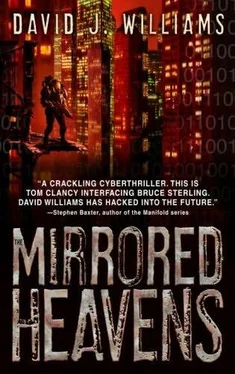But now the space around them is beginning to broaden and the smoke up ahead’s clearing. The sky itself is coming into view.
So is the Citadel.
“Oh Jesus,” says Haskell.
“Doesn’t matter,” replies the mech. “We’re not stopping.”
They streak in toward it.

The Elevator’s center is more than two thousand klicks above the Earth. Which means it orbits at a slower rate than do ships at the level of the Antares. Now that it’s got all its brakes on maximum, that delta’s increased even further. It’s moving out of the cockpit window, falling behind.
But as far as the Operative is concerned, it’s still way too close for comfort.
“Don’t bother calling,” says Maschler. “Communications are fucked.”
“When did you lose them?” asks the Operative.
“We never did,” says Riley.
“Stop talking riddles,” snaps the Operative.
Maschler shrugs. “All we’ve got is mission control on automatic feed. It’s not like we’re in touch with anything that’s up for conversation. All we’ve got is just updates every minute confirming our position.”
“And the order to stand by for translunar injection,” says Riley.
“But no order to initiate the burn,” says Maschler.
“We’ve tried to raise the emergency channels,” adds Riley. “They’re not responding. No one is. We’ve asked for clarification of the situation. We’ve received nothing.”
“Let me try,” says the Operative. “Key in whatever codes you need to give me access.”
He couldn’t pick up shit earlier. But that was when he was back in the bowels of the ship. Now he can pipe directly into the ship’s own lines. He can commandeer the main comlinks. He can raise Earth directly.
So he does. Wireless signals dart out from within his skull, words wrapped within codes that vector through the ship’s mainframe before streaking out into vacuum. The Operative plays with the frequencies, fine-tunes the direction of the dishes on the hull.
Somewhere on the planet something hears him.
“Get off this line,” says a voice. It echoes in the Operative’s head: a growl shot through with static. The weight of atmosphere hangs heavy on the words.
“I’m using the channel I’ve been instructed to use in case of contingency,” replies the Operative. He chooses his words carefully. His lips aren’t moving. Neural implants are doing all the work. “I’m following my orders. You can see my position.”
“I can,” says the voice. “What do you want?”
“I want confirmation of this ship’s original flight plan to be relayed to its pilots.”
“We can’t do that,” says the voice.
“Why not?” says the Operative.
“Because it’s out of our hands. You’ve got a real knack for timing, Carson. The place is in lockdown up there. You’re smack-dab in the middle of the largest joint U.S.-Eurasian operation ever conducted.”
“So the East really is involved.”
“What did you expect? The Elevator’s joint property, isn’t it?”
“What’s happened to it?” asks the Operative.
“Hostiles have seized it,” says the voice.
“No kidding,” says the Operative dryly. He pauses. Then: “Who are we talking about here?”
“That,” says the voice, “is the question that I’m going to have to cut you off to get back to.”
“So it’s not the Jaguars,” says the Operative.
“Whoever it is is coordinating with them,” says the voice. “That’s the operating assumption. But we’re having a hard time believing they’re the ones who’ve managed to get aboard that thing. We recommend you hold tight for now. If the situation deteriorates, take whatever measures you have to in order to preserve the mission. But as long as the situation’s stable, stay put.”
“You’ve got a funny definition of the word stable, ” says the Operative.
But the presence in his head has disappeared. The voice is gone. The Operative’s eyes refocus on the cockpit. He takes in the faces of Maschler and Riley.
“You okay?” says Maschler.
“Sure,” says the Operative.
“Did you get through?”
“Sure,” says the Operative.
“And?”
“And nothing.”
“Nothing,” says Maschler.
“Nothing?” asks Riley.
“You get used to it,” says the Operative.

But what you don’t get used to is what these third-world cities are like in their rafters. It’s all dilapidated towers. It’s all smog all the time. But get high enough, and you might shake that smog yet. You might see the clouds burn red with the light of the dying sun. You might see them burn still redder with the flames from the dying Citadel.
“Fuck,” says Marlowe.
Half of the Citadel’s towers are no longer visible. Its ramps hang askew in air. All too many of its platforms are shattered.
“So much for refuge,” says the razor.
Yet as they rise past it, long sticks of light stab down from somewhere far overhead, shoot past them, and strike the complex below. Explosions flash out into the gathering dark. Towers topple into the murk that laps around them.
“Those are our guns.”
“Yes,” says Marlowe.
“We’re killing our own side.”
“Our own side’s already been killed. That place has been taken.”
“So keep on climbing.”
He accelerates. They leave the Citadel behind, rush upward toward sky and sanctuary.
* * *

The Elevator’s barely visible from the window anymore. But the cameras make up for everything the window lacks. The Elevator’s lowermost point is starting to glow. It’s hitting atmosphere. Far above, swarms of ships are closing.
“How long before we leave the launch window?” asks the Operative.
“Eleven minutes,” says Riley.
The first ship touches. The telescoping lenses show power-suits clustering along that ship’s sides, pulling open doors, entering the Elevator. The cameras indicate that this is happening at fifty-klick intervals all along the structure. Half the ships involved show the Stars and Stripes. The others show different sets of stars. Marines from both superpowers: they’re going in.
“They’ve done it,” says Riley.
“They’re there,” says Maschler.
“Prime the engines,” says the Operative.
“I thought you said we weren’t going anywhere,” says Riley.
“Never say never,” replies the Operative.
Besides: priming isn’t the same as firing. The one enables the other. It doesn’t compel it. So now Maschler and Riley are swinging into action. They’re cycling fuel through the tanks, readying the trajectory, prepping everything they can. It gets their minds off the waiting.
But not for long.
“Who are they facing in there?” says Riley.
“Have they issued demands?” says Maschler.
“Now what would make you think I’d know a thing like that,” replies the Operative.
“Well,” says Riley, “do you?”
“I’d be guessing,” says the Operative.
“Well,” says Maschler, “what’s your guess?”
“My guess,” says the Operative, “is that there’s only one demand.”
Maschler and Riley look at him.
“Eat shit,” he says.
Suddenly the cockpit lights up as though someone’s stuck a blowtorch right outside it. The cameras show nothing save flash. The screens go haywire. Half of them show critical malfunctions. The other half are blank.
“We’ve got a problem,” says Riley calmly.
Читать дальше















